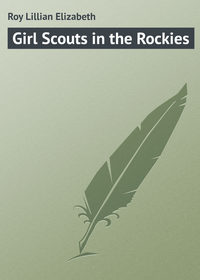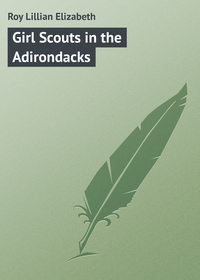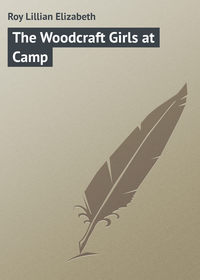 полная версия
полная версияThe Woodcraft Girls in the City
Enough light reflected from the shiny tin of the inside cans to show the boys where to walk, and they started off on the hazard of finding a house or village where they could use a telephone.
“Let’s study the stars while they are gone. Who can tell us a new story or find the old planets?” suggested Zan.
So the time passed quickly until the campers heard a whoop from the woods and saw the flickering of the two lights as the boys approached the fire.
“What did you find out?” cried Jane and Zan, as they jumped up from the grass to run and meet the messengers.
“Good joke on Jack and Fiji! They just telephoned a few minutes before we did. They were wondering what had happened to you girls. They said that Bob knew well enough where to go as he saw the tree blazed as a sign for you,” said Fred.
“So I did, but the day we came over to hunt up a site, we were in the auto and to-day I came by boat, so it looked very different. Besides, both places look alike as far as woods and beach and sandy cliff go,” responded Bob.
“Did they say they would look us up to-night?” asked Zan.
“They haven’t the slightest idea where to find us in the dark, so they will remain at the camp where they are and pick us up in the morning,” explained Fred.
“Well, thank goodness, we know they are safe and sound, although I felt sure they were, right along,” sighed Jane.
“Yes, indeed, two athletic boys like Fiji and Jack would be all right,” added Eleanor, really believing her own words – such is the changeableness of a dual nature.
The tired Woodcrafters then retired and sighed as they stretched out weary bones on the cots or under the stars on soft pine beds.
“Gee! This is the life!” chuckled Bob, as he bounced up and down on the springy spruce-tip bed.
“Guess the midgets haven’t reached you yet!” grumbled Billy, as he slapped viciously at an unseen plague.
Then Fred began slapping and whipping the air, and finally Bob felt the mosquitoes and midgets bite, until all three boys jumped up again and began building a smudge fire.
“Oh boys! If you would only come over to our camp and help us build a smoke like yours! We can’t sleep a wink!” cried Zan.
Fred and his helpers soon had a number of small smudge fires burning about the tents and the girls thanked them sincerely as they felt relief from the pesky insects that make camping a trial.
The gay carolling of a few late birds woke the campers, and Miss Miller was soon out ready to start breakfast. The others all declared for a morning dip, and were soon splashing and playing in the surf. The boys preferred to go in later, however, and take the morning hour before breakfast to catch some fish.
“Maybe we’ll get enough for breakfast and dinner, too!” said Bob.
By the time the girls were dressed, the boys returned to land with three goodly sized fish and the news that they had spied a smoke rising from a campfire some two miles down the shore.
“It’s Fiji and Jack – I wish we could surprise them at breakfast,” laughed Zan.
“I have an idea!” ventured Bob. “Right after breakfast, let’s take as many as can get in the launch and start down the coast; the others can hike through the woods and meet us there. On the way back we will make the others ride home and the first batch walk.”
“I’ll ride the aqua-plane,” offered Elizabeth.
“Why don’t you let some of the other girls do that?” asked Fred.
“They don’t know how.”
“But it isn’t hard to learn. I can show them how to balance in a few trials. Do you want to try after breakfast, Zan?” returned Fred.
“Oh, I’d love it!” cried Zan.
So breakfast was quickly disposed of because the girls anticipated great sport with the plane. Billy was detailed to steer the launch while Fred showed the girls how to balance and guide the ropes to make the aqua-plane skim lightly over the waves.
After many upsets and great shouting and excitement, the girls could manage the plane quite well. Then as the young engineer increased the speed of the launch and the plane fairly flew over the water, the riders felt as if they were aviators, the sense of the rest for their feet disappearing in the dizzy pace with which they sped over the surf.
“I thought you folks wanted to hunt up the lost boys?” called Miss Miller, when she thought the girls had had enough of the drenching sport for that morning.
“So we will, now that we can take turns on the plane as we go alongshore,” called back Zan.
“We’ll have to draw lots for the pleasure – there are too many here to ride on the way down,” said Fred.
The lot was chosen by having each girl draw a blade of grass from the Guide’s hand. The shortest piece would win. It fell to Elizabeth, and the other girls all said it was a reward for her sacrifice of enjoying the fun while the others were practising.
The girls who were to hike were just ready to start out when a canoe shot around the point of the promontory and a voice bawled out:
“Well, I must say! A lot of fine friends Jack and I have!”
“I must say! You’re a nice host to lead a lot of
“Don’t tell me you never knew that! Why, everyone knows that a clam swims in with the tide and burrows down in the wet sand to sleep. If you walk over its little mound it spurts water up like a geyser,” returned Zan.
“Come on, girls, let’s make ’em spurt!” urged Billy, who was very fond of all sports, fishing included.
The launch and aqua-plane were drawn up on the beach and soon sixteen busy clam-diggers were bending over, laughing, and calling to each other, at every clam discovered. It was great fun.
After half an hour of this pastime, the Guide asked Zan and Hilda to go with her and build a fire and prepare the kettle for the chowder. But they had scarcely completed the laying of the fire-wood when Eleanor joined them.
“Oh, my back aches so! I think clamming is dreadfully hard work. How you folks can find sport in everything you do is beyond me. Now I would much rather help fix the fire and let one of you two girls take my place clamming,” remarked Eleanor.
“The fire’s all ready, and Miss Miller is going to start the chowder. But you can help collect more wood from that grove so we will have a pile on hand,” said Zan, with a frown.
Eleanor ran away and Zan looked at the Guide, but her face expressed nothing that would encourage the girl to criticise the indolent member of the Band.
Eleanor was gone a long time without having brought in any wood when Hilda was asked to go in search of her.
“Good gracious me! Not only does Eleanor make a burden of herself for the Band but now she needs a nurse to watch and keep her from mischief!” declared Hilda, impatiently.
Hilda ran off and Zan stood watching her out of sight. Then she turned to the Guide: “Now what next?”
“I have just been thinking that we might have potatoes with fish for lunch and save that chowder for supper when the visitors are here.”
“Um – it’s very filling, I have heard,” commented Zan.
Miss Miller laughed. “Yes, and it needs a long time for cooking well. Besides, we won’t need to waste any good time over an elaborate meal with that chowder to found on.”
“Will there be fish enough to go round?” asked Zan.
“Yes, Jack brought up several fine fish that Fiji and he caught at dawn this morning, so we ought to fare very well.”
Hilda now came back with Eleanor strolling after her – Hilda carrying the heavy load of wood, and Eleanor whipping the heads from some late goldenrod with a switch.
“I found her stretched out on some moss blinking up at the blue sky!” reported Hilda, disdainfully.
“Why shouldn’t I rest after working so hard? Look at the wood I found,” retorted Eleanor.
“Why didn’t you lug it into camp? There’s no credit due you for finding a few sticks if you don’t carry out the task to fulfilment,” scorned Zan.
“Miss Miller, I’m sick of this business! I never was so hard worked in my life, and to think how everyone finds fault with me for not doing more,” said Eleanor, testily.
“I wonder if any of you girls stopped to think that you could start a list for your fish coups by knowing and studying the fish caught here. Suppose you all begin with these three kinds,” suggested Miss Miller, wisely.
“That’s so, we never thought of it,” cried Hilda.
“Dear me, why didn’t we try to place those fish this morning? Did you know them, Miss Miller?” asked Zan.
Eleanor was interested in the fish, too, and so another fatality for the new member was averted.
“I knew the white fish we had this morning, and I see here is another. That other fish I believe to be a sea-trout but we will have to verify that by asking the boys. They will know.”
“And that smaller one – if the boys know we will have three on the list already, won’t we?” said Zan, eagerly.
“Of course the boys know – they seem to imbibe knowledge of this sort by instinct. Why, a boy never has to learn to swim, he just flops in the water and sails along like a frog, while we timid females try and try again before we can get the stroke,” declared Hilda.
The clam-diggers came up with a large reward for their aching backs and sun-burn, and the plan of starting a list of fish was proposed by the Chief. Thereafter, more interest was shown in the three kinds of fish on exhibit than any of the girls could ever remember before.
While the Woodcrafters sat eating luncheon, a peculiar whistle sounded from the woods back of them.
“Sounds like a tramp signalling a pal to come and enjoy this lunch,” teased Bob.
“You seem to forget that we girls won a coup for knowing our native birds this Summer. I know what kind of a bird that is, too. Anyone else here recognise it?” said Zan.
“Don’t tell! Don’t – please. Let us new members try to place the sound and sight and begin on our bird coups,” interrupted Anne Mason.
“Come on, hurry up! We can wash dishes later,” added Frances.
“You girls go, and I will remain here with the boys to clear away the dishes and follow after you later,” offered the Guide.
So the Band ran away and shortly after Miss Miller and her helpers finished the chores and went into the woods also. About an hour was spent in interesting study and pursuit of Nature’s lore, when a sound coming from the direction of the camp reached the crowd.
“That’s a kind of bird I know at once!” laughed Zan.
“It sounds like the siren on your Dad’s machine,” ventured Jane.
“It is. I guess the company have arrived and are waiting for a welcome,” added Fiji.
At that, the Guide turned and the Band trailed after her to the camp-site where they found the doctor impolitely prying into the state of the larder, and two ladies with two children laughing at his remarks when he discovered the fragrant chowder.
“Oh, there’s Edith and Baby!” cried Elizabeth, running to greet her mother and the children.
Having saluted the Woodcrafters with great ceremony, the doctor said: “Some people have been busy this morning, judging from preparations for dinner.”
“We just had to dig to provide enough for you – when we heard you had invited yourself to dinner with us,” retorted Zan, who always enjoyed a wordy combat with her father.
“Well, I must confess, I brought my normal appetite with me, so it will be fortunate if the others have anything to eat,” replied Dr. Baker.
“If you admit your appetite is normal now, what will it be after you have had a dip in the briny?” laughed Fiji.
“To insure ourselves against emergencies I had Moses pack some of his unexcelled southern cake and pies,” answered Mrs. Remington, pointing to a huge hamper that had escaped notice.
“Oh, we know Mose!” laughed Fred, running over to investigate.
“Gee! Looka-here boys!” called Billy, as one goody after another was lifted up and displayed to the circle of gourmands.
“Come, come, Bill! Leave them in the hamper so they won’t dry or be covered with ants,” advised his mother, going over to assist him in obedience.
“Who’s ready for a sea-fight? In these days of deep-sea warfare we should have practise to be ready to swim after a U-boat, if necessary,” called the doctor, seeing the hamper once more left in order and safety.
“Me for the briny!” called Bob, running to the boys’ tent.
That morning, Fiji had discovered a deep pool directly under the sandy point of the promontory, and this offered an excellent spot for diving. While the more timid jumped about or swam nearer the beach, the older and more experienced of the party enjoyed the dives and deep water. Teddy and Edith found an impromptu pier made of drift-wood where the launch was anchored, and here they played store, having tin cans and shells for receptacles to hold sea-sand flour and sugar.
Long before the merry bathers were ready to come out, the Guide and Mrs. Baker and Mrs. Remington went to the tents and dressed. Then they began preparations for the supper-party.
The doctor always provided fun and laughter wherever he went, so the evening meal was a jolly affair that night. After the young folks declared they could laugh no more, Mrs. Baker said without a smile, “You all are most gullible.”
“Why?” demanded a chorus of voices.
“Why? Why to sit here and laugh while the doctor is making away with that chowder. I haven’t seen him pause a moment between spoonfuls while he had you all laughing too heartily to eat.”
“Then he’ll want to stay all night!” complained Bob.
Everyone laughed, for the tone said as plain as day: “I hope to goodness he won’t!”
“That is all I’ve been waiting for – an invitation,” replied the doctor.
“We can’t tuck you in anywhere. You’ll have to win a coup for sleeping out under the stars,” laughed Zan.
“Don’t worry, friends! Doctor is only teasing. He has to be back in the city at nine to-night to meet a physician and consult over a case,” explained Mrs. Baker.
“Then we’d better make the most of the time left us,” urged the doctor, jumping up ready for anything proposed.
“Shall we dance?” asked Nita.
“Oh, be considerate! Remember I enjoyed the chowder more than was reasonable and I am not in a mood to play Na-na Bo-jou!” warned the doctor.
Everyone laughed again at that, for Na-na Bo-jou is one of the most active of all energetic dances performed by Woodcrafters.
“Why not sit quietly about the fire and hear a story?” suggested Mrs. Baker.
“Let Mrs. Remington tell it – she is a regular bookful of legends and Indian lore,” quickly added the Guide.
The idea was heartily endorsed by the others and Mrs. Remington began:
“How the Weasel Got His White Breast.
“A long time ago, before there were any Indians, the world was inhabited by spirits. These spirits were the souls of all the animals and plants and things we see to-day. One of them was called Kanhlalas, the Weasel. He was little and brown and lived in a field. One day a strange thing happened to him. Listen, I will tell you about it.
“Near the field where the Weasel had his home there was a mountain. On top of the mountain lived an old man called Waida Dikit, the Speckled Trout. He felt lonely up there, so he sent for Saroki Sakahl, the Green Snake. When Saroki came Waida Dikit took him to his wigwam and said:
“‘My son, here is pipe and tobacco. Let us smoke awhile.’
“Saroki sat down by the wall and smoked. He smoked so much that soon Waida Dikit could not see across the wigwam.
“‘My son,’ said he, taking his own pipe from his mouth, ‘you are a strong smoker.’
“Saroki did not answer. After a time Waida Dikit stuck his head from the wigwam and saw that the whole world was covered with the smoke from Saroki’s pipe. Waida Dikit was frightened. He felt about on the floor for his flute.
“‘You have smoked enough,’ he said to Saroki. ‘Here is a flute. Let me hear you play.’
“Saroki took the flute and played for three days and three nights without stopping. By the end of the first day Waida Dikit could see through the smoke which was fast thinning, and he could see the other side of the wigwam.
“By the end of the third day the smoke was all gone and the blue sky could be seen once more. Then Saroki stopped playing.
“‘You are a good player,’ said Waida Dikit, ‘but I know a better one. He is Kanhlalas, the Weasel that lives down there in the field. I will send for him.’
“In a little while Kanhlalas came, bringing his own flute. When he was comfortably seated in the middle of the wigwam, Waida Dikit said to him: ‘Saroki Sakahl thinks he is a fine player. If you play he will know what a good player really is.’
“Kanhlalas took his flute, swelled out his chest, and began playing. He played all day and all night without stopping. By morning he was so out of breath that there appeared a white stripe down the middle of his breast. He merely swelled out his chest a little more and went on playing. Waida Dikit and Saroki Sakahl became frightened.
“‘Stop!’ cried both of them. ‘Something will happen. We know that you are the best player now.’
“But Kanhlalas would not listen nor would he stop playing. He only played harder and harder. By the end of the third day his breath was entirely gone and he had to stop. But it was too late!
“His whole breast was white as snow and from that day to this every weasel has had a white breast.”
As Mrs. Remington concluded the story the campers signified their disapproval of such a short tale by demanding another, but Dr. Baker declared it was time they started for home.
“But do wait and let us have one dance to pay Mrs. Remington for the story,” cried Nita, springing up ever ready to perform.
“Girls, show our visitors the dance-song of ‘Summertime,’” suggested the Guide.
The Band then performed the song to graceful steps and motions and the audience loudly applauded when it was finished.
“Mother, why can’t I stay over-night with Elizabeth and the other, girls – Zan says they can find lots of room for a little girl like me,” pleaded Edith.
“Yes, do allow the child to remain with us. It is only for one night, you know,” added Miss Miller.
“Why, you seem to have so many already, that I would not like to add to the care,” responded Mrs. Remington, doubtfully.
“I’ll be so good, mother, that it will be no care!” begged Edith.
“And we will look after her, mother,” added Elizabeth.
“I wanna stay, too!” now demanded the youthful Theodore Roosevelt Remington, aged four.
“No, no, Baby, Mother needs you at home!” quickly said Edith.
To the little girl’s delight, she was permitted to remain and the others started for home, leaving the weary hostesses to seek tents and cots where all were soon fast asleep, despite the mosquitoes.
CHAPTER EIGHT – QUIET WAYS FOR SUNDAY
At breakfast the following morning, Miss Miller said: “This being Sunday, we must find a quiet form of enjoyment.”
“That won’t deprive us of a swim, will it?” asked some of the anxious campers.
“Why no, but I do not think we ought to shout or dance or do the noisy or boisterous things that are permissible on a week-day.”
“Let’s discuss it later. I am having such a fine time with this breakfast at present,” said Zan, munching a mouthful of delicious camp-biscuit.
“So say we all of us,” laughed Jane, eyeing the platter that was in Fiji’s hands. It held two fish-cakes and she was keen for one of them.
“These fish-cakes made of the left-over fish of yesterday and that steamed brown rice, are the finest I ever tasted,” remarked Fiji.
“Well, for pity’s sake take one and pass the other this way,” ordered Jane, losing patience as she saw Fiji compare the two to help himself to the larger one.
“I wanted the one left,” ventured Jack, teasingly.
“I’m the oldest, Jack, and so I have first choice!”
Everyone laughed at the twins as they generally argued this point of the hour’s difference in age, when it was a question of one obeying the other.
“You may be oldest but I am handsomest, and besides I have always been delicate. The doctor told Mom to give me more fish!” retorted Jack.
“Hem – yes! They claim that fish is food for the brain, and goodness knows, you need something to develop that atrophied grey matter!” taunted Jane, reaching for the platter.
“Children! As Chief of this Tribe I cannot have such talk, hence I will eat the fish-cake myself!” declared Zan, taking the platter Fiji passed, and helping herself to the last bit.
Everyone laughed at the outcome of the argument, and Jane sighed while Jack smacked his lips as he watched the Chief make a great to-do over the final crumb of fish.
“While we wash dishes and clear camp the boys can go and bring in fire-wood for this noon. Then we can have a story, if you like, until it is time to have a dip,” said the Guide, as they all got up from the grass.
“No sooner said than done!” answered Fred, starting for the woods.
When the chores were done, the campers gathered about the Guide who proposed that they go to the cliff and sit on the sand to hear the tale.
“Who’s turn is it for a legend?” asked Elena, after they had found comfortable positions on the warm sand.
“Doesn’t matter whose – we always vote for Miss Miller,” replied Hilda.
A chorus of “How’s!” approved this suggestion and the Guide smiled.
“Let me see! I think I will tell you a Tlingit Myth. It is called ‘The Wolf Chief’s Son.’
“Famine visited a certain place in Alaska one time and many people died of starvation. But there was a young boy who always went to the forest with bow and arrow to hunt food for his family and friends and was never selfish about giving it to others.
“One day, as he was hunting, he found a little animal that looked like a puppy dog. This he placed under his blanket and carried home. When he washed it carefully and took it to his mother to see, she knew it was a wild forest dog.
“The boy then painted the dog’s face and feet with some red paint left him by an uncle and when he again went to the forest to hunt he took the dog with him. There the little animal ran about and brought his master grouse, birds, and other game, so the boy could carry home more food than ever before. And this was cooked in a basket-pot by his mother.
“The next day, the boy again put red paint on the feet and nose of the dog, that he might trace the little fellow as he ran through the woods. That day the game caught by the dog kept all the boy’s friends from starving.
“One day, after the boy had traced the red trail made by the dog a long way into the forest, he found the little animal had found and killed a mountain sheep. This was taken home and the fat part given to the dog as a reward. The rest of the sheep kept the boy’s kindred alive that week.
“The next time the boy and his wild dog went hunting, they found a large flock of mountain sheep. The dog ran in and killed every one for his master. The best one was cut open and the dog was fed the tenderest part and the other sheep were enough to keep most of the villagers from starving.
“Then the boy’s brother-in-law grew jealous of the many kind things the villagers said of the boy who hunted and brought in so much food. He went to the boy and said: ‘I wish to hunt and want to borrow, your dog.’
“The boy did not like to loan to another the little wild forest companion he had become attached to, so he asked: ‘What do you want of my dog?’
“‘It is doing great things for you and I too wish to find food without striving hard for it,’ replied the man.
“The boy sighed but his sister implored him to do as her husband asked, so the boy brought his little dog and carefully painted his feet and face. Then he turned to his brother-in-law and said:
“‘When he kills a sheep, be sure and feed him the best part. I always do that and the dog knows it.’
“The man took the dog and they went to the mountain where a flock of sheep was grazing. The dog ran in and soon killed every one of them, but the hunter cut open an old ram and threw the entrails in the dog’s expectant face, saying, ‘Dogs eat the insides when a man needs the tidbits and outside flesh of an animal.’
“The little dog stood motionless for a moment, then, instead of eating the entrails as ordered, ran straight up the mountain-side yelping and crying pitifully, for the gall smarted as it ran into his eyes.
“The man laughed and carted home the sheep, but the boy looked about quickly and said: ‘Where is my little dog?’











